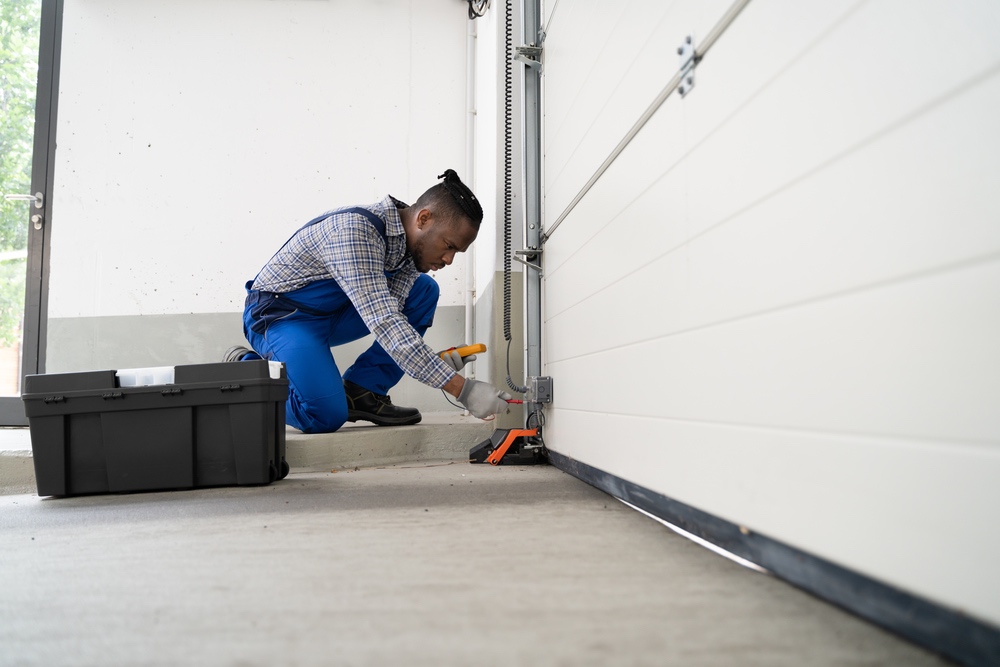Your garage door is meant to make your life easier, so it certainly shouldn’t make it louder. The thing is, a noisy garage door implies something isn’t working quite right. So, if you notice unusual sounds in your garage door system, it’s crucial to figure out what’s causing them and address them as soon as possible.
In this blog, we’ll break down the most common causes of loud garage doors and give you our best tips on taking your garage door from noisy to noiseless.
Why is Your Garage Door So Loud?
Lack of Lubrication
One of the most common reasons garage doors make noises is the lack of proper lubrication on moving parts. Lubrication helps prevent corrosion, which can cause squeaking or grinding sounds.
Worn or Damaged Rollers
Garage door rollers experience wear and tear whenever you open and close your garage door. Over time, they can start grinding or squeaking as the door moves along the tracks. They can also cause your door to move out of alignment.
Worn or Damaged Hinges
Garage door hinges can also wear out or become damaged. Damaged hinges make a loud, creaking noise when the door moves.
Loose Hardware
Loose nuts, bolts, or screws in your garage door system can rattle and create noise when operating.
Broken Springs
Torsion and extension springs help balance your garage door’s weight to ensure it opens and closes smoothly. If damaged, worn, or not properly adjusted, they can make your garage door very loud. Additionally, loose springs can make your door off-balance.
Broken springs can be especially dangerous. For instance, if the torsion springs are damaged, your garage door could fall quickly and off-track.
Old or Faulty Garage Door Opener
Garage door openers are one of the most essential parts of garage systems. Noises from your garage door opener usually indicate that the motor is dying. This means your garage door opener may be failing, especially if you have an older one.
Tips to Quiet Your Garage Door
Lubricate the Moving Parts
Rollers, hinges, springs, and tracks need to be lubricated about every six months with silicone spray or white lithium grease. Using a high-quality lubricant will help lubrication last longer. We also recommend vacuuming the tracks beforehand to have a clean surface and help the lubricant spread evenly. Make sure you disconnect your garage door opener before working on your garage.
After lubricating your garage door, open it to ensure everything is running smoothly. If you notice anything that needs repair, the Blue Chip Garage Doors team can help. Give us a call to schedule a professional check-up.
Replace the Rollers
Lubrication can help get rid of noises associated with worn-out rollers. However, depending on the type of rollers you have and how worn out they are, you may need to get them replaced. Plastic rollers tend to wear down more quickly and must be replaced every two years. Steel and nylon rollers tend to last longer.
If lubricating your rollers didn’t make a significant difference, contact a professional service to get new rollers installed.
Replace the Hinges
If your hinges are still in good condition, try lubricating them first. However, if they’re broken, worn out, or have dust or metal fillings around them, you should have a professional help you replace them.
Tighten the Nuts, Bolts, and Screws
Tighten all nuts, bolts, and screws in your garage door system using a socket wrench or pliers. Inspect the hardware on the door itself, track supports, and opener. Be careful not to overtighten them, since you could risk stripping the lag screw holes or pulling the carriage bolt heads through the door. Retightening the garage door’s hardware often helps quiet it almost completely.
Call a Professional to Adjust or Repair the Springs
Attempting to adjust, repair, or remove your garage door’s springs on your own can be extremely dangerous. If lubricating your door’s springs didn’t remove the noise, or if you suspect they are worn out or damaged, contact us immediately so our trained technicians can adjust or repair them as needed.
Upgrade Your Opener
Today, you can find advanced garage technology that helps your garage door run a lot smoother. Upgrading to a newer garage door opener might be the key to fixing a noisy garage door. Look for openers with features like belt drives, which tend to be quieter than chain drives. Our experts at Blue Chip Garage Doors will advise you about the best opener options for your garage.
Besides following these tips to quiet your garage door, you should still get regular check-ups to keep your garage door working seamlessly. Our team of specialists offers professional garage door services that guarantee your garage door system’s safety, reliability, and long-term functionality. Reach out to us today to schedule a maintenance appointment!

